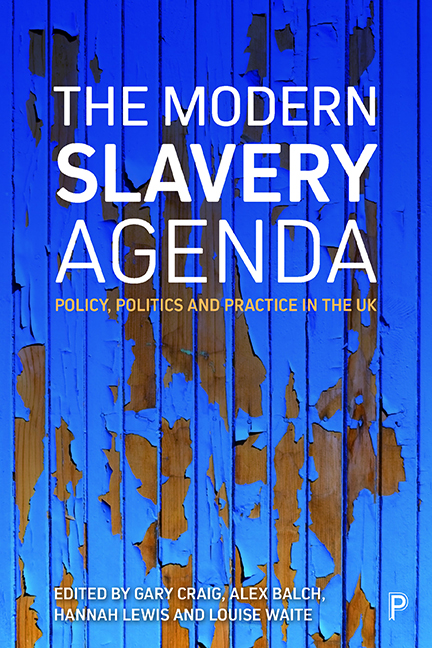Book contents
- Frontmatter
- Dedication
- Contents
- List of tables, figures and boxes
- Notes on contributors
- Editorial introduction: the modern slavery agenda: policy, politics and practice
- one Modern slavery in global context: ending the political economy of forced labour and slavery
- two The UK’s response to modern slavery: law, policy and politics
- three Defeating ‘modern slavery’, reducing exploitation? The organisational and regulatory challenge
- four Class Acts? A comparative analysis of modern slavery legislation across the UK
- five Child trafficking in the UK
- six Human trafficking: addressing the symptom, not the cause
- seven Still punishing the wrong people: the criminalisation of potential trafficked cannabis gardeners
- eight Modern slavery and transparency in supply chains: the role of business
- nine Migrant illegality, slavery and exploitative work
- ten The UK’s approach to tackling modern slavery in a European context
- Index
seven - Still punishing the wrong people: the criminalisation of potential trafficked cannabis gardeners
Published online by Cambridge University Press: 20 April 2022
- Frontmatter
- Dedication
- Contents
- List of tables, figures and boxes
- Notes on contributors
- Editorial introduction: the modern slavery agenda: policy, politics and practice
- one Modern slavery in global context: ending the political economy of forced labour and slavery
- two The UK’s response to modern slavery: law, policy and politics
- three Defeating ‘modern slavery’, reducing exploitation? The organisational and regulatory challenge
- four Class Acts? A comparative analysis of modern slavery legislation across the UK
- five Child trafficking in the UK
- six Human trafficking: addressing the symptom, not the cause
- seven Still punishing the wrong people: the criminalisation of potential trafficked cannabis gardeners
- eight Modern slavery and transparency in supply chains: the role of business
- nine Migrant illegality, slavery and exploitative work
- ten The UK’s approach to tackling modern slavery in a European context
- Index
Summary
Introduction
There is a long-standing recognition that the UK is a destination country for human trafficking for cannabis cultivation. This chapter examines the existing knowledge about human trafficking for cannabis cultivation in the UK, with a specific focus on how Vietnamese nationals are most commonly being exploited for this purpose. It then moves on to its main focus: the criminalisation of those potentially trafficked for cannabis cultivation. Trafficked persons who are exploited for the cultivation of cannabis in the UK are committing criminal offences under the Misuse of Drugs Act 1971. However, if we recognise people trafficked to grow cannabis as having been abused and exploited, and as victims of crime or human rights violations as a result of coercion and abuse, then punishing them should be seen as highly inappropriate. The criminalisation of trafficked persons is also counterproductive for efforts to prevent trafficking and prosecute traffickers.
The criminalisation of potential trafficked cannabis gardeners in the UK is highly inappropriate from a moral standpoint and, just as significantly, also contradicts the expectations of the 2005 Council of Europe Convention on Action against Trafficking in Human Beings (CAT) and policy and legislation on the non-punishment of trafficked persons in the UK. CAT Article 26 expects states to provide for the possibility of the non-punishment of trafficked persons, declaring:
Each Party shall, in accordance with the basic principles of its legal system, provide for the possibility of not imposing penalties on victims for their involvement in unlawful activities, to the extent that they have been compelled to do so.
Over the last seven years, policy and legislation have been introduced to ensure that the UK acts in respect of this Article to prevent people from being punished for criminal acts committed as a direct consequence of their trafficking. In 2010, the Crown Office Procurator Fiscal Service (COPFS) published guidance on the non-punishment of trafficked persons in Scotland (COPFS 2010). In 2011 the Crown Prosecution Service (CPS 2011) in England and Wales produced policy on the non-punishment of trafficked persons. The Public Prosecution Service in Northern Ireland (PPSNI 2013) published policy on non-punishment in October 2013.
- Type
- Chapter
- Information
- The Modern Slavery AgendaPolicy, Politics and Practice in the UK, pp. 167 - 186Publisher: Bristol University PressPrint publication year: 2019

